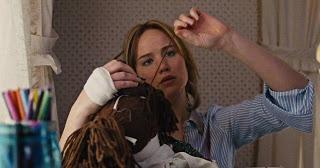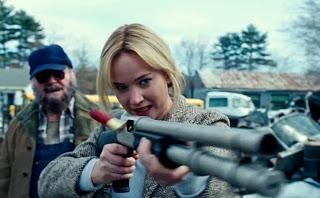 Joy (2015) is a biopic of Joy Mangano, inventor of the Miracle Mop. That's likely why trailers promote the movie as vaguely as possible, showing Jennifer Lawrence firing shotguns and talking like a Mafioso. Lawrence and David O. Russell wring some drama out of their unpromising premise, though it's far from either's best work.
Joy (2015) is a biopic of Joy Mangano, inventor of the Miracle Mop. That's likely why trailers promote the movie as vaguely as possible, showing Jennifer Lawrence firing shotguns and talking like a Mafioso. Lawrence and David O. Russell wring some drama out of their unpromising premise, though it's far from either's best work. Joy Mangano (Jennifer Lawrence), divorced with two kids, suffers a menial job and a constantly-warring family. Her ex-husband Tony (Edgar Ramirez) lives in the basement, refusing to leave or work; mom Terri (Virginia Madsen) watches television; dad Rudy (Robert De Niro) runs an auto business and dates Italian entrepreneur Trudy (Isabella Rossellini). Joy has a flash of inspiration, creating a no-wring mop.
Like Russell's recent films, Joy dwells heavily on the heroine's rough-and-tumble relationships. But this time, he doesn't seem invested in Joy's personal drama; her family members are cartoons, broadly played. The usual zip and repartee isn't there, save an early scene where Rudy loses his cool. Joy's rivalry with half-sister Peggy (Elisabeth Rohm) carries no drama, since Peggy's a cold-blooded monster; Terri's romance with a handyman (Jimmy Jean-Louis) is too back-grounded to register.
It doesn't help that Russell's Scorsese plagiarism carries over from American Hustle, with ironic song choices, artsy montages and tedious narration by Diane Ladd, as Joy's grandmother. Odd bits of symbolism drift about: Joy's disturbed by cicadas' 17-year hibernation; Terri's favorite soap opera, restaged with increasing absurdity; Joy walking through a cascade of fake snow. Effective scenes, like Joy letting off steam at a firing range, visiting QVC or confronting a scheming investor, remain self-contained.
 Joy works better as a feminist character study. Early scenes establish Joy as a would-be inventor stymied by a life that moved way too fast. With stained blouse and unkempt hair, she's forced to work, fix her mom's plumbing and keep her family from killing each other. Inured to drudgery, her frustration proves an ideal mixture with ambition. No matter how many skeptical businessmen or backstabbing suppliers Joy faces, she won't be denied.
Joy works better as a feminist character study. Early scenes establish Joy as a would-be inventor stymied by a life that moved way too fast. With stained blouse and unkempt hair, she's forced to work, fix her mom's plumbing and keep her family from killing each other. Inured to drudgery, her frustration proves an ideal mixture with ambition. No matter how many skeptical businessmen or backstabbing suppliers Joy faces, she won't be denied. Jennifer Lawrence is such a gifted actress, we don't mind that she's a decade too young. Who better than Katniss Everdeen to sell such a tough character? Lawrence plays with a laser-focused determination that sells the character. We fully believe her, whether stumbling through a television pitch or intimidating a Texas businessman through bluff. Through everything, we never lose faith in Joy, nor in Lawrence's ability to captivate us.
Edgar Ramirez (Carlos) provides amiable support as singer-turned-layabout, who improbably turns into Joy's best advisor. Bradley Cooper gets a scene-stealing bit as the QVC executive who gives Joy her break. Others are mere types: Robert De Niro a grouch, Virginia Madsen a kook, Elisabeth Rohm a penny-pinching shrew. It's nice seeing Isabella Rossellini, but she does little except drink wine and fret over money.
Joy ultimately is a mixed bag. It's a definite improvement on the overreaching American Hustle, but can't recapture Silver Linings Playbook's hard-edged sentimentality. Credit Jennifer Lawrence for its successes; as for David O. Russell, a little filmmaking discipline goes a long way.

